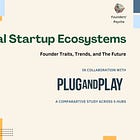Vision 2030 in Action: Plug and Play’s Role in Saudi’s Innovation Boom
Abdullah Al Akeel shares how Plug and Play overcame early resistance and became a pillar of Saudi’s innovation journey.
In a country once known more for oil than entrepreneurship, a quiet revolution is underway. At the heart of it stands Abdullah Al Akeel—Managing Director of Plug and Play Saudi Arabia—who, through vision, persistence, and a little serendipity, has helped shape a thriving startup ecosystem nearly from scratch.
This blog was part of study I did with Plug N Play Tech Center where we comapred 5 regional startup ecosystems. You can check it out here -
We sat down with Abdullah to learn how Plug and Play has adapted its global model for the unique context of Saudi Arabia—and why the future of innovation here will look very different from what you might expect.
From Landscape Architecture to Startup Acceleration
Abdullah’s story began far from entrepreneurship. Originally trained in landscape architecture, he found himself in the San Francisco Bay Area just as companies like Facebook and YouTube were taking off. While tech wasn’t his focus, he was close enough to the scene to be intrigued.
A chance encounter with Plug and Play’s Abu Dhabi team during a layover changed everything. That eight-hour stop became a turning point. He joined the Abu Dhabi office, with the quiet goal of one day bringing Plug and Play to Saudi Arabia.
By 2021, that goal was realized.
Launching in a Resistant Market
Starting Plug and Play in Saudi wasn’t easy. In 2020, Abdullah faced closed doors and skeptical corporates. He recalls meetings where executives dismissed the idea of collaborating with startups outright.
“People were like, ‘What are you trying to do here?’” he said. “There was resistance to working with new technologies, especially from startups.”
But the tide was about to turn.
Riding the Vision 2030 Wave
The Saudi government’s Vision 2030 became the inflection point. This long-term plan aims to diversify the economy beyond oil, placing innovation and entrepreneurship at its core.
“Vision 2030 changed everything,” Abdullah said. “It gave a clear signal to the private sector—startups matter.”
Plug and Play Saudi leaned into this vision by becoming an implementation partner for numerous government-backed innovation programs. From the Misk Foundation to the Saudi Data and AI Authority, Plug and Play began embedding itself deeply within the country's innovation infrastructure.
Localizing the Plug and Play Model
While Plug and Play’s model works globally, it needed tailoring in Saudi. For instance, while corporates in the US or Germany often drive innovation, Saudi’s transformation is government-led.
“Here, the government sets the mandate,” Abdullah explained. “Our job is to translate that into real startup support—through acceleration, partnerships, and soon, investment.”
Programs were adapted to fit local needs:
Focus on fintech, environmental sustainability, and infrastructure tech
Bringing international mentors and operators to upskill Saudi founders
Providing access to government support and grants—one of the strongest value-adds in this market
Challenges, Learnings & Red Flags
Abdullah shared a refreshingly honest view of what hasn’t worked. Their early AI-focused smart cities program didn’t yield results. “The market wasn’t mature enough yet,” he admitted.
Plug and Play Saudi has since developed a robust evaluation framework, including both quantitative (market size, team quality, traction) and qualitative (coachability, communication skills) metrics. Red flags include solo founders without strong support, irrational behavior, or teams with weak complementary skills.
Surprisingly, they also make room for local nuances. In a collectivist society like Saudi Arabia, family members on the cap table are common. “It’s not always a red flag here,” Abdullah noted. “It’s part of how things work.”
What Founders Want
Abdullah believes Saudi founders want four things from Plug and Play:
Access to government and regulatory support
Corporate and business development opportunities
Fundraising support
Global credibility and alumni networks
There’s also growing demand for mental health and wellbeing support—something Abdullah says is missing and urgently needed.
Looking Ahead to 2030
What does the future hold? Abdullah sees Saudi as a fully built “house” by 2030—with smart cities, global startups, and a strong layer of well-being-focused innovation built atop it.
“We’re still building the house,” he said. “But once it’s done, we’ll furnish it with the kind of innovation the world hasn’t yet seen from this region.”



